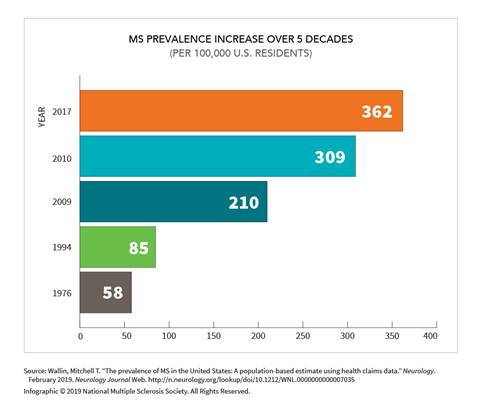MS Interethnic/Interracial Group Variability Research has demonstrated that MS occurs in most racial and ethnic groups, including Blacks, Asians and Hispanics/Latinos/Latinx. Susceptibility rates vary among these groups, with findings suggesting that Black women have a higher than previously reported risk of developing MS (Wallin et al., 2012 ; Langer-Gould et al., 2013 ). In the largest genetic study of people with MS of non-European ancestry, investigators obtained DNA samples from 1,162 Blacks with MS and 2,092 Blacks without MS, as well as 577 Whites with MS and 461 Whites without MS (Isobe et al., 2013 ). The team looked for similarities and differences in 128 gene variants that have been associated with MS. They confirmed associations of key immune-response genes (HLA) with MS among African Americans. However, among 73 non-HLA genes that were associated with MS among White Americans, only 8 were associated with MS among African Americans. The authors concluded that MS genetic risk in African Americans only partially overlaps with that of Europeans and could explain the difference of MS prevalence between populations. Conversations about the genetic contribution to MS risk should include mention of the complex interaction with environmental factors. Increased incident rates of MS and generally worse prognosis in African Americans suggest social, environmental and genetic risk factors that impact disease (Amezcua & McCauley, 2020 ). Research has demonstrated that MS occurs in most racial and ethnic groups, including Blacks, Asians and Hispanics/Latinos/Latinx. Susceptibility rates vary among these groups, with findings suggesting that Black women have a higher than previously reported risk of developing MS (Wallin et al., 2012 ; Langer-Gould et al., 2013 ). In the largest genetic study of people with MS of non-European ancestry, investigators obtained DNA samples from 1,162 Blacks with MS and 2,092 Blacks without MS, as well as 577 Whites with MS and 461 Whites without MS (Isobe et al., 2013 ). The team looked for similarities and differences in 128 gene variants that have been associated with MS. They confirmed associations of key immune-response genes (HLA) with MS among African Americans. However, among 73 non-HLA genes that were associated with MS among White Americans, only 8 were associated with MS among African Americans. The authors concluded that MS genetic risk in African Americans only partially overlaps with that of Europeans and could explain the difference of MS prevalence between populations. Conversations about the genetic contribution to MS risk should include mention of the complex interaction with environmental factors. Increased incident rates of MS and generally worse prognosis in African Americans suggest social, environmental and genetic risk factors that impact disease (Amezcua & McCauley, 2020 ). 
